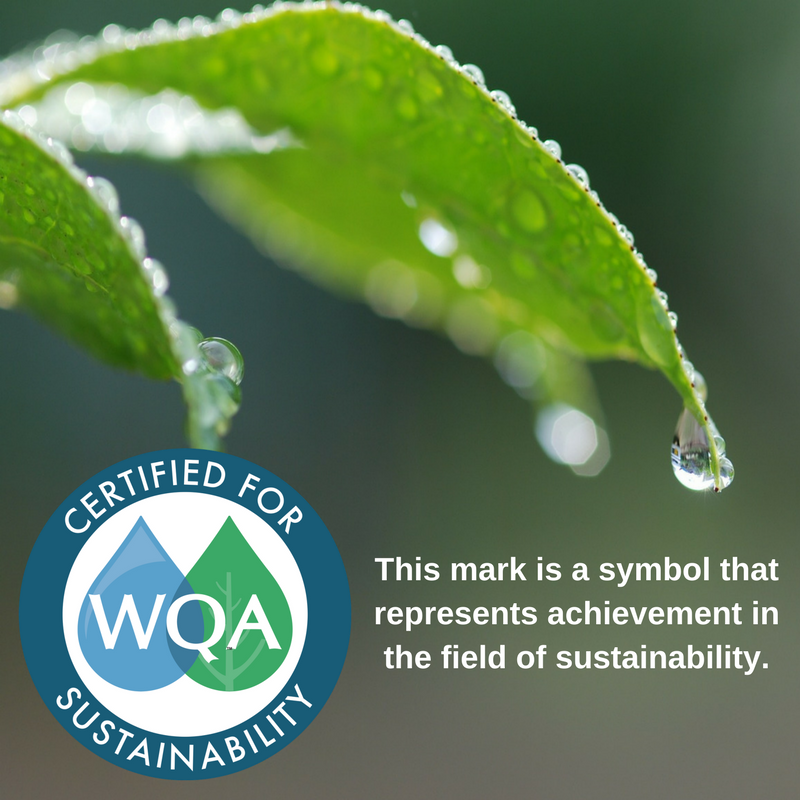
WQA’s Sustainability Certification Program is the first of its kind in the global drinking water treatment industry. The Sustainability Certification Mark assures you that a product has been sourced, manufactured, and managed through its projected life-cycle according to recognized best practices in environmental sustainability and corporate social responsibility. It represents leadership in the field of sustainability and supports responsible profits by helping to identify products that are safe for both people and the planet.
The WQA Sustainability Certification Program is currently the only environmental certification program in the world to earn ANSI accreditation to ISO 17065 and ISO 14024 for Type I Environmental Labeling. This provides independent, third-party verification that a product is environmentally responsible in all phases of its life cycle: from raw materials, production, distribution, use-phase, all the way through to end-of-life disposal. View the ANSI listing webpage and certificate for accredited certification programs here.
WQA’s Sustainability Certification Program offers certification to two primary standards, WQA/ASPE/ANSI S-802: Sustainable Activated Carbon Media for Drinking Water Treatment and WQA/ASPE/ANSI S-803: Sustainable Drinking Water Treatment Systems.
Why Sustainability Matters
Consumers want products that are sustainable and environmentally responsible. Consultants, Resellers, and Manufacturers are becoming increasingly concerned about making environmental claims for fear that they might be accused of “green-washing,” which is the practice of making unfounded, misleading, or unsubstantiated environmental claims.
The WQA members and board directed the proactive development of a voluntary certification program for sustainable water contact products to meet growing demand on the part of manufacturers, consumers, retailers, regulators, and environmental groups, .
A product is defined as “sustainable” if it meets the needs of the present without compromising the needs of future generations. These needs are further delineated as encompassing responsibility for the three P’s of sustainability:
- People: the safety and welfare of production workers and consumers);
- Planet: the continuing health of our ecosystems); and
- Prosperity: the economic realities that the product must fulfill a need, perform as advertised, and be offered for a competitive price – all of which lead to success in the marketplace.
Sustainability is more of a journey than a destination, and embarking on this journey does require some initial investment of resources. However, most sustainability initiatives actually produce a positive return on investment over time. This is because, in practice, sustainability is largely about reducing waste and improving efficiency. Therefore, these efforts usually result in some or all of the following longer-term cost savings, including in raw materials, energy and water consumption, manufacturing/productivity, occupational health and safety, waste disposal, hazards management, regulatory compliance, public relations, and reduced risk (business, liability and regulatory).
WQA’s Sustainability Certification in a Nutshell
- WQA has been recognized for more than 50 years as a leader in the field of product certification for the drinking water treatment industry.
- By participating in this first-of-its-kind environmental labeling program for the water treatment industry, you can demonstrate leadership in the marketplace on behalf of your company and its products.
- It allows you to promote your environmental achievements on products and literature to retailers and consumers.
- It helps your company decrease costs by eliminating waste and inefficiency.
- It minimizes regulatory and liability risk by eliminating hazards in the workplace and reducing the environmental footprint of your products.
- The ground-breaking WQA Sustainability Standards were developed through intensive collaboration with manufacturers and sustainability experts.
- Industry-sponsored voluntary certification programs often preempt the establishment of mandatory, typically more onerous, government regulations.
- Conducting a Life Cycle Analysis of your products can be costly and time-intensive, but the WQA Sustainability Standards already incorporate elements of a Life Cycle Analysis for your product category, thereby eliminating the need for you to make a separate investment.
- WQA’s points-based standards allow you to pick and choose from a menu of sustainability choices, customizing your efforts to best suit your circumstances and sustainability goals.
- WQA will guide you through the certification process with personalized consultation, including a resource library of materials. We can provide case-studies on the benefits of embracing sustainability and template environmental policies and reports to help you comply with the requirements of the standards.